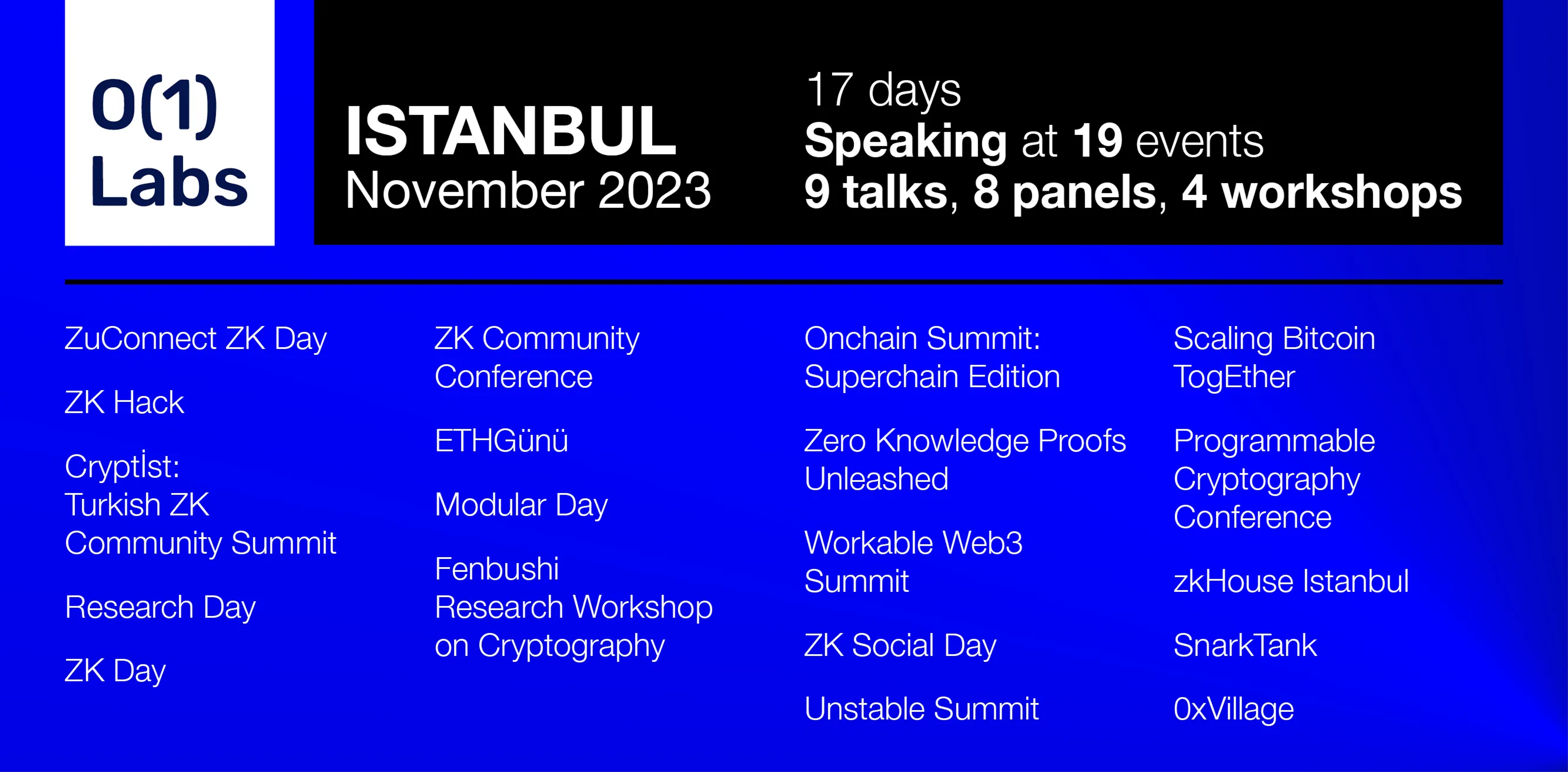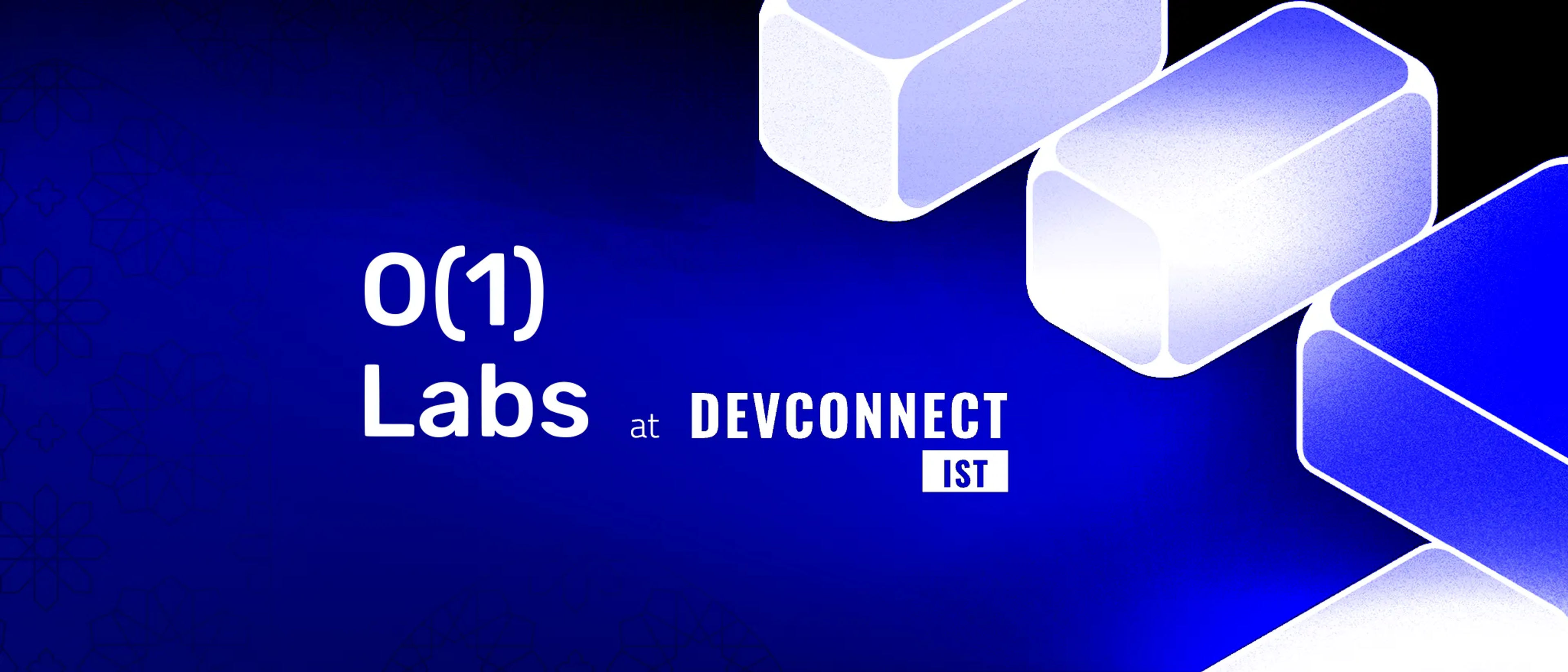Another DevConnect has drawn to a close, leaving us with reflections, new connections, and a renewed vision for the future of Web3. In the bustling heart of Istanbul, the o1Labs team was in full swing, deeply engaged in the pulse of the event. We weren’t mere spectators; we were catalysts of conversations and initiators of adoption.

Hosting four immersive workshops, contributing our expertise to nine impactful talks and eight panels, and sponsoring a few more, our presence was palpable across DevConnect. Additionally, as a proud Partner sponsor at ZK Hack, our involvement resonated deeply, drawing in the most participation and submissions from the vibrant pool of zk developers — solidifying our commitment to driving innovation and fostering the next generation of applications powered by zero knowledge cryptography. As we look back on this participation, we can’t help but dive into some of the emerging trends and pressing challenges that continue to shape the industry.
Reflecting on DevConnect Istanbul and the Evolving Web3 Landscape
DevConnect (and Devcon) is always a one-of-a-kind experience that reminds us of the amazing energy, ideas, and people in Web3. This recent DevConnect in Istanbul was particularly special as it is the home city of o1Labs CEO Emre Tekişalp. It was a unique experience for us to be able to share our insights and expertise with local developers and zk enthusiasts. And for that, we thank the entire DevConnect team at the Ethereum Foundation and the fantastic group of leaders and volunteers from Türkiye.
However, amidst the grandeur of prestigious venues and vibrant crypto events, a concerning trend persisted. It seems as if this was another crypto conference with thousands of Web3 professionals, yet discussions still predominantly circled infrastructure without much focus on sustainable adoption. At times it felt like the same old echo chamber our industry has already gone through in past cycles, just with different names and technologies.
Don’t get us wrong; thanks to crypto, it is significant that open-source communities and up-and-coming Web3 projects are finally getting some much-needed funding and visibility. But this trend raises crucial questions about our actual impact. How can we create more meaningful products and services? What actual value can we create for our communities? It’s time to move beyond the same routine discussions, happy hours, and parties to focus on initiatives that drive tangible change within the Web3 space and beyond.
Talking the Talk to Walking the Product Walk
While we see ambitious crypto projects targeting the likes of stablecoins, real-world asset tokenization, NFTs, and DeFi, we are still left searching for the next “killer app” that will bring the next 100 million or 1 billion users on-chain. But we see some obvious reasons why that hasn’t happened yet:
- Terrible user experience, particularly with cumbersome key management
- High fees ($10-$50 to transact when networks are congested is not acceptable)
- Transparency levels are lower than Web2, impacting privacy
Addressing these issues is pivotal. Implementing easy-to-follow onboarding will remove the first hurdle many users entering Web3 currently face. It was no surprise that at ETHDenver earlier this year, account abstraction received an enthusiastic response — highlighting progress and consensus in simplifying user experiences — a crucial first step.
When it comes to high fees, L1s have all taken different approaches in addressing this through different trade-offs in the “blockchain dilemma”, whether it is different consensus protocols or Mina’s constant size. But the reality is that a lot of the “industry action” is still in Ethereum, and while Ethereum’s fees stay in the range of dollars, not cents or fractions of a cent, we’re not going to hit genuine scale.
The good news is that both Ethereum and the rollups themselves are embracing that fact. L2s already offer significantly lower fees than Ethereum Mainnet and EIP-4844 will improve that further. What was exciting to us about DevConnect was that the L2s have moved far beyond merely “redeploy your app here for lower fees” and are rapidly building out their own ecosystems, communities, and new technologies. Optimism’s Onchain Summit had a vibe of its own mini conference, and it was great to see projects come together to solve one of crypto’s biggest challenges.
And finally, transparency and privacy can, of course, be addressed with zero knowledge. While zk has been pivotal in facilitating scaling in the form of zk-rollups, the “magic” privacy potential has not yet been fully realized. And at DevConnect, we observed many sessions from projects presenting on how zk fits into their roadmap.
Reframing Identity and Privacy
Identity and credentials have re-emerged in the last two years as a major focus of new Web3 projects, evident in numerous events during this Devconnect. Yet, industry murmurs hint at their perceived lack of sustainability: no evident revenue models akin to DeFi, uncertain paths for value capture by VCs, and questionable user demand beyond a mere concept. It was a recurring topic of agreement that privacy is rightly held as an important principle, but it needs a compelling value proposition and robust business case to catch on.
“Privacy is normal” is a maxim in the industry. But we’d argue that in addition, the right to keep your data private and self-sovereign, and then to choose to monetize it if you wish, will also be normal and important in the future and is a business case for projects and users alike. Let’s not forget that personal data is the currency of the Web2 industry, and for the average person, it’s valuable enough to matter. Discussions like this at DevConnect underscored the pioneering role of our strategic partner, Snickerdoodle Labs, who is leading the way by combining identity, privacy, and user value through incentivized rewards.
Our discussions also delved into the interplay of regulations, identity, and zero knowledge. The prevalent notion cites regulation as the main blocker, especially regarding financial KYC and privacy-preserving zk identity. However, regulations are not all bad news for zk. Consider regulatory frameworks like GDPR that stress minimal data collection and immediate deletion after use. This begs the question: shouldn’t companies adopt zk to curtail data collection and facilitate immediate deletion while proving data usage without long-term retention? This practice aligns with legal obligations and also presents what may be a multi-billion dollar business case. With practical application layer zk technology at our disposal, time is ticking — regardless of industry recognition.
Oracles and zk: Major disruption ahead?
Market data is the lifeblood of the DeFi industry. It is far more complex than for TradFi, and not just because it requires trustlessness. However, the Web3 market data industry pales in comparison to TradFi despite seemingly having many more PhD mathematicians and entrepreneurs per capita. The culprit is the gas costs of doing anything on-chain beyond simple oracle calculations.
Enter zk, the antidote to this limitation — unlocking off-chain, trustless market data calculations through verifiable computation. We think it will result in a massive expansion in the range of data and the sophistication of its usage — a topic we fervently discussed at the unStable Summit. While price feeds are crucial in collateral assessment and risk mitigation, the current practice of static feeds falls short of the potential that oracles can bring. What if we can predict that a liquidation will depress the price by 20%? What if we can see that a flash loan attack is artificially inflating the collateral price? More sophisticated off-chain calculations could augment static price data and allow assessment of liquidation impact and warning signs of attacks.
This technology is already possible. Why isn’t the oracle industry embracing it? Some projects are — our partner DIA Data began exploring zk over a year ago, and more recently, Tellor joined the o1Labs Partner Program to do the same. Our guess is that the market is temporarily stuck in constrained thinking, constrained by muscle memory from the old world before zk, and constrained to thinking it needs to limit the size and complexity of data services. It’s time to accelerate innovation based on off-chain verifiable computation before the next Mango-style attack.
Looking ahead…
So, as amazing as experiencing Devconnect in Istanbul was, for us, it was a much more potent wake-up call to start unquestioningly focusing on use cases and products with strong value propositions. As the Berkeley update for the Mina protocol draws near, the pressing demand within our ecosystem, including us at o1Labs, is to become more product-led.



